-
Car Reviews
- All reviews
- Midsize SUVs
- Small cars
- Utes
- Small SUVs
- Large SUVs
- Large cars
- Sports SUVs
- Sports cars
- Vans
Latest reviews
- Car News
-
Car Comparisons
Latest comparisons
- Chasing Deals
The Corolla Sedan Hybrid may be an Uber-driver’s fantasy ride, but the entry-level Ascent Sport proves itself a worthy family car too
This could be the most sensible car on earth. First of all it’s a Toyota Corolla, the best-selling car in history, and thus the equivalent of automotive white goods.
Next, it’s got the pragmatic choice sedan body – more rear space and boot space, and no terribly modern hatchback rear end.

It’s also the entry-level Ascent Sport grade, because the buyer isn’t sucked in with pricey and unnecessary features found on posher models.
Lastly, there’s hybridisation. Nobody goes wobbly at the knees at the driving joy brought by a hybrid powerplant, but the fuel economy on offer here – 3.5L/100km – is a nerdy accountant’s fantasy.
But let’s rejoice this car exists, because there really should be a Corolla for everyone. If you want to do the Targa Tasmania, buy a two-seat, 224kW/400Nm turbocharged road-going rally car in the GR Corolla.
If bowls club and early-to-bed are more your thing, the Corolla Sedan Accent Sport hybrid (catchy name, I know) is nothing short of a hero car.
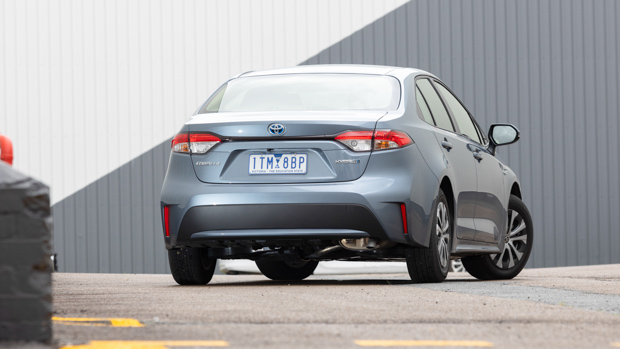
It’s a hard car to pick holes in because it’s just so Very Fit For Purpose. It won’t climb mountains, carry seven people or be fun at a race track, but for simple A to B driving or comfortable cruising in safety and economy it’s spot on.
Most will live in urban areas and have just one or two occupants – the Australian norm – but there’s little reason it can’t serve a family of five too.
Any Toyota with a hybrid badge slapped on its rump has seen hefty price increases these past few years – supply and demand and all that.
But the latest rise last November particularly stings. The Sedan Ascent Sport hybrid saw the biggest rise of any Corolla model, up $3785 to $31,180 before on-roads.
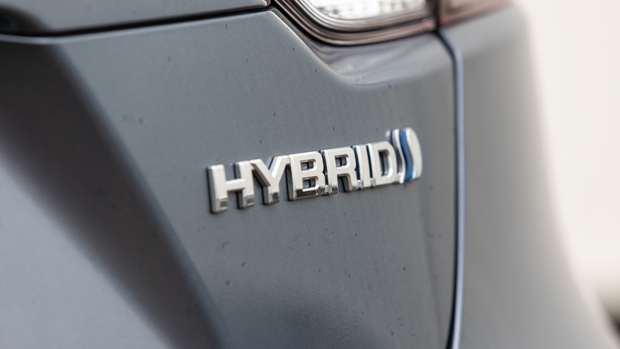
At least there was some justification. The cars now feature Toyota’s upgraded fifth-generation hybrid powertrain, offering a 13kW increase over the old version, for a combined output of 103kW from the 1.8-litre petrol four-cylinder with newly-developed front-axle mounted electric motor.
The hybrid’s lithium-ion battery has also been lightened (by 14 percent) and its input and output power increased.
A cheaper non-hybrid sedan is $28,130; an SX $31,280 or $33780 as a hybrid, while current range-topping ZR is $36,620 or $39,120 if hybridised.
Non-hybrids use a 126kW/203Nm 2.0-litre non-turbo four-cylinder with CVT auto gearbox (manuals have been discontinued). Toyota claims they will use 6.0L/100km. These non-hybrids slurp 7.6L/100km in town.
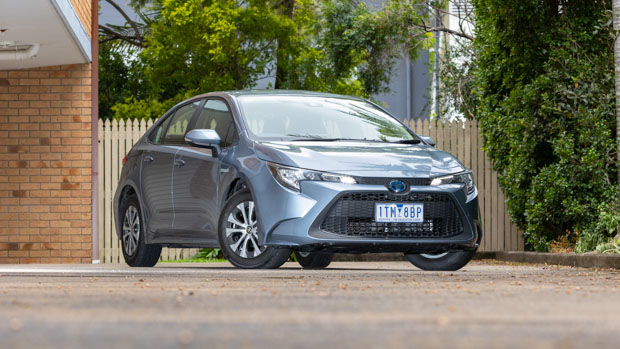
Next to the urban return of 3.4L/100km for the hybrid, city drivers can quite literally cut fuel bills in half.
If you’re shopping for a small sedan and haven’t been paying attention in the Covid/post-Covid era, yes, prices have surged across the board.
The days of the $20k Corolla have gone, while your cheapest Hyundai i30 is an Active manual for $23,720; a Kia Cerato S (auto) is $25,990, while Mazda 3s start from $27,040 for a G20 Pure. Sedan hybrid rivals around the $30k mark simply don’t exist.
It may be the lowest on the rung, but the Ascent Sport Hybrid doesn’t feel completely rental car spec – key infotainment, convenience and safety kit haven’t been overlooked. But you’re far from spoiled.
You’re already in for over $35,000 to driveaway one of these (told you entry-level price rules have changed), but if you find a few extra grand down the sofa to move into an SX hybrid, the car feels a bit more 2023.
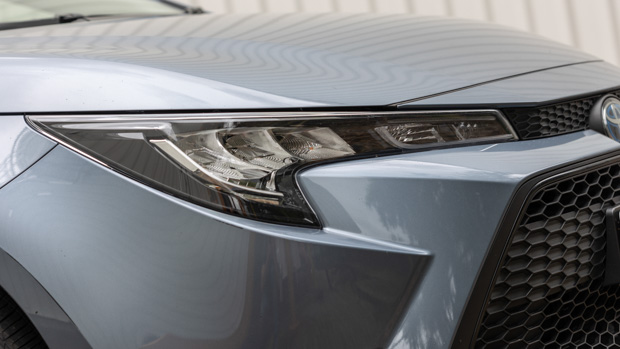
There are LED lights all round and alloy wheels included – they’re 16-inch now replacing the titchy 15-inchers as seen in the photos of our test car.
Inside is an 8.0-inch touchscreen with wireless Apple CarPlay and wired Android Auto, DAB+, built-in sat nav, a USB-C port and 4.2-inch TFT driver information. There’s smart entry and start, single zone climate control and electronic parking brake.
So what do you miss? The roughly $38,000 driveaway SX Hybrid adds rain-sensing wipers, classier steering wheel and gear lever, wireless phone charger, a 7.0-inch driver info display and paddle shifters.
The range-topping ZR Hybrid (about $43,500 driveaway) adds 18-inch alloys, heated faux leather electric sports seats, ambient lighting, 12.3-inch digital driver display and JBL audio.
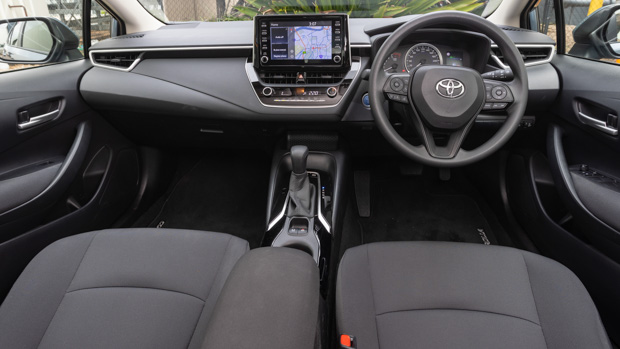
All Corollas, including this Ascent Sport, come with Toyota Connected Services complimentary for 12 months.
This includes some potentially life-saving tech (see safety section below), but also the ability to control and monitor elements of your car through the myToyota Connect app.
Using this you can remotely check fuel, driving range, whether doors are locked and whether windows are up or down. You can remotely lock the car, start it, beep the horn or activate the hazard lights. It will also help you locate it if lost in a car park.
Your only free colour, stingily, is Glacier White. You may as well stick an Avis badge on the rear glass. It’s $600 to add some colour, such as the Silver Pearl in our images.
You’re not just paying more for the hybrid due to its economy. There’s reasonable shove from the petrol/electric motor setup, and the most enjoyable aspect is running at low speed or in traffic using electric only.
Unlike, say, a full electric car or plug-in hybrid, there’s nothing to daunt you here. All happens in the background – saving you fuel money – while you just drive.
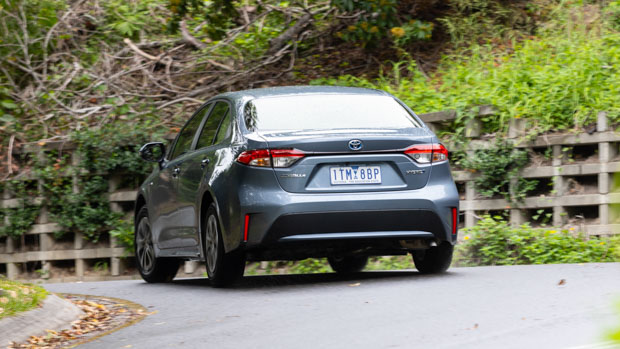
It’ll start up in silence, using just the battery and electric motor, and cruise up to 50km/h in this way if you gently massage the throttle.
The small battery soon exhausts itself, but charges pretty quickly while you decelerate or brake, and does so without you noticing.
You can harvest more charge to the battery by putting the gear lever into ‘B’ rather than ‘D’ which brings more regeneration (a bit like gentle braking) when off the throttle. Even with ‘B’ engaged, the drive remains pleasingly smooth.
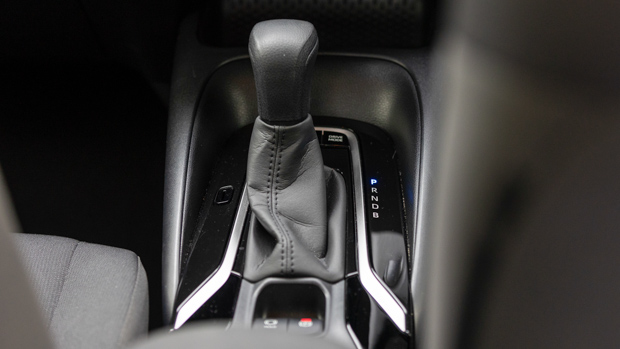
There’s much to like about a properly efficient hybrid that doesn’t ever need plugged in, yet can move in slow speed traffic with zero emissions.
When the petrol engine is in play it fires up with little drama, and cruises along blissfully at 1500rpm at 110km/h. There’s not much road noise and the included radar cruise control works superbly.
More good news when you hit bumps. The Corolla Sedan on its balloon-like tyres absorbs most jolts in a manner more akin to a larger car, there’s good steering feel and it even handles a corner with decent balance thanks to independent rear suspension.
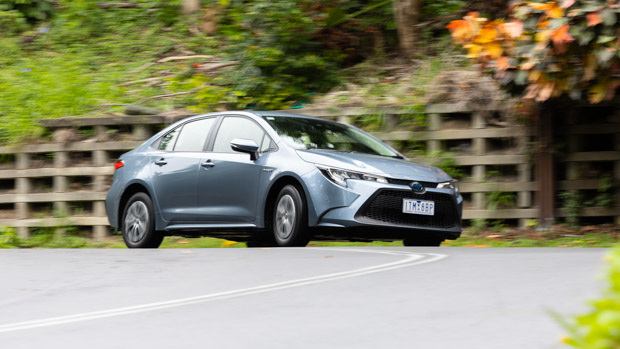
Like the Corolla hatch it’s a very well set up car, and while the 103kW combined output doesn’t sound much, the low-speed torque pull is surprisingly zesty.
Its eco tyres are the weak link, especially in the wet where they run out of grip early and will spin up if you plant the accelerator.
Few would use their Corolla Sedan as a country road corner-carver (car renters excluded, of course), so the tyres are the right choice for economical urban users. As a town car, really, this Corolla Sedan hybrid is a standout.
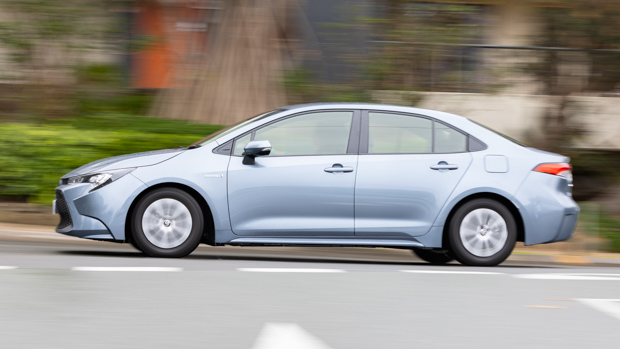
From a safety perspective, visibility is helped by little windows at the base of the A-pillars – smart thinking. Special mention to Toyota’s lane departure alert with steering assist too.
We’ve tested some shockers over the years, but the setup here is calm and helpful rather than overtly nannying.
Poke around the cabin and the $35,000+ drive-away price doesn’t sit that well. The steering wheel feels too cheap and plastic, the embossed fabric seats are decidedly average (although damn comfy) and there’s rock-hard scratchy plastic for door tops.
It feels a more spacious, wider car than expected when sitting up front. It’s simple with few frills and there’s a chunk of piano black to break up the grey-on-grey.
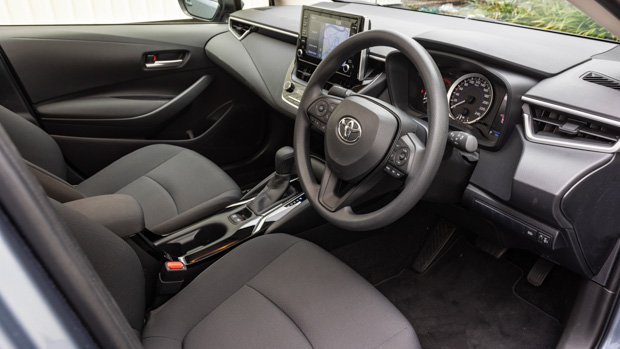
But the dash is soft touch, the climate and steering wheel buttons clear and easy to use, and while the infotainment screen’s a bit stick-on rather than integrated, it too is user-friendly.
Toyota’s operating system also passes as good enough, but smartphone mirroring always wins out. Wireless CarPlay’s a superb addition (still wired for Android), but then its usefulness is compromised by no wireless phone charging.
The Corolla hatch may trump exterior style, but this sedan’s the pick for carrying rear passengers. The five-door’s seriously cramped in the back, but the sedan will handle two adults or three kids in fair comfort.

At six foot my head was on the ceiling in the middle seat, and in the outward seats the roof and rear windows slope in such a way that it’s a bit claustrophobic and my head hit the roof side when cornering. Leg room is fine, but no rear air vents are a black mark.
The Corolla hatch has a comically small 217-litre boot in most grades – the sedan’s more than double that at 470 litres is a big advantage.
Rear seats fold 60/40-split, while underneath is a space saver spare.
Overall there’s little to surprise and delight in the cabin, but if you favour a clean smart layout with no fripperies it’s hard to fault. The key basics are covered, and for many buyers that’s the ideal.
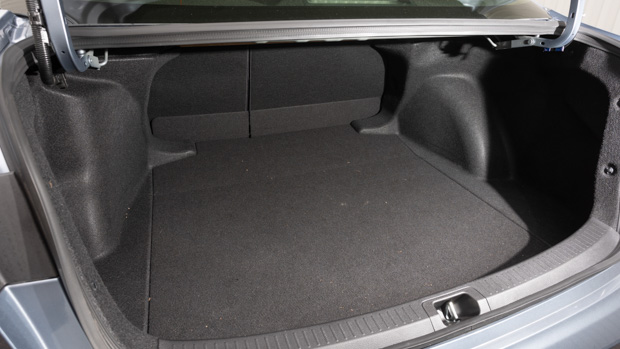
It was awarded a maximum 5 stars with ANCAP on its 2018 test. It scored a superb 96 percent for adult occupant safety, a less impressive 83 percent for child occupant safety, 86 percent for vulnerable road user and 76 percent for safety assist.
That latter score shows the standard kit isn’t as comprehensive as it should be according to today’s stricter demands.
The Ascent Sport must be optioned with a $1000 Convenience Pack, this adding rear cross traffic alert and blind spot monitor.
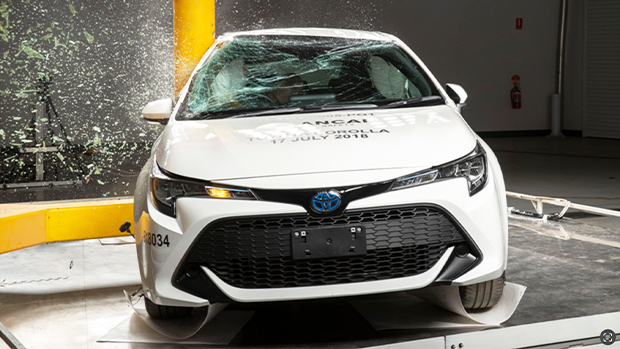
It may be the entry-level model, but such is the purchase price – and Toyota’s commitment to safety – these really should be included.
Most road testers (and owners) find these two items, along with auto emergency braking, far more useful than often over-nannying lane and steering assists.
The Toyota Safety Sense suite is included in Corollas range-wide, bringing:
Bizzarely, and unlike the Corolla hatchback, you don’t get front and rear parking sensors.
The included Toyota Connected Services can provide assistance in an emergency. If the airbags are deployed or if a collision is detected the car automatically notifies an emergency call centre, allowing the driver to speak with an operator.
Alternatively, the driver (or passenger) can manually trigger a call to a call centre via a roof-mounted SOS button.
While other Connected Services (such as tracking in case the car’s stolen) require a $9.95-$12.50 monthly subscription (the first 12 months are free), the above safety stuff remains complimentary.
Compellingly cheap. With high fuel prices and swathes of the population tightening their belts, having a car with seriously low running costs helps explain the popularity of series-parallel hybrid Toyotas.
The Corolla hybrid has a quoted fuel use figure of 3.5L/100km overall and even less – 3.4L/100km – in town.
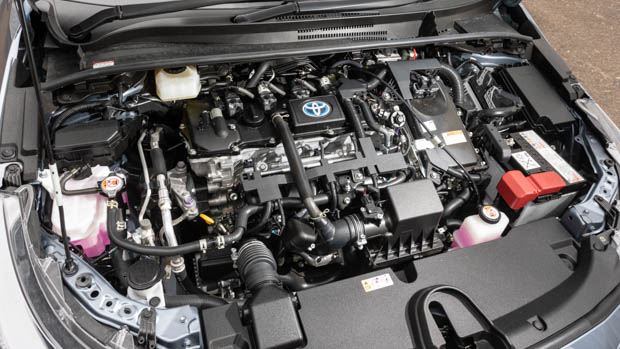
That’s simply remarkable. Compare that to a non-hybrid Corolla’s 6.0L/100km and 7.6L/100km numbers and the fuel savings are mammoth. It only requires 91 RON as well.
On our test, starting with a full tank, the indicated range remaining was over 1200km. Incredible. We averaged 4.3L/100m over a mix of town, country and highway use; a bit more than quoted, but it was often with four in the car.
With just the driver cruising on the highway, 3.6L/100km was seen over a 120km journey.

Not long ago you had to buy Toyota’s aesthetically-challenging (ok, damn ugly) Prius if you wanted a small car with incredible economy; now you get the same in the familiar Corolla nameplate.
The Corolla has fixed price servicing for the first five years, and it’s very cheap. Visits are annual or every 15,000km and cost $245 a pop. A very reasonable $1225 for your first five.
Warranty is five years/unlimited-kilometres – the industry average today. Worth noting rivals Kia, Mitsubishi and MG have longer warranties.
Is it really the most sensible car on earth? Fuel economy in town is witchcraft-good, there’s (just) enough space for four adults, and technology and safety tick the required boxes.
The ride’s comfortable, it steers and handles well and the interior is a study in pragmatism and ease-of use.
Boringly good? Yes. But that’s why the Corolla is history’s best-selling car. Sexiness has never been the model’s strong point, and the sedan body out-dowdies the hatch. But with over twice the boot size, the four-door’s the pick if practicality conquers all.
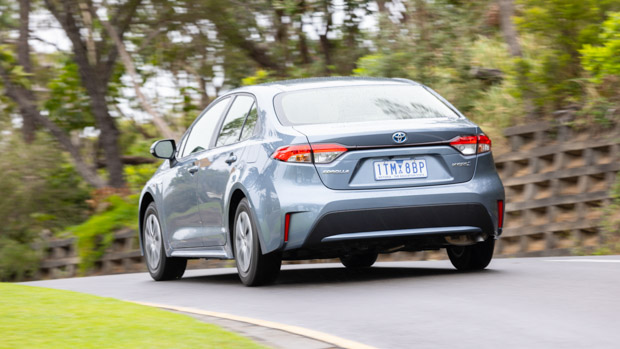
This Corolla Sedan Ascent Sport hybrid was $26,335 at its launch three years ago. Now almost $5000 dearer it’s a testing price, but Toyota’s improvements to the hybrid system and tech help lessen the blow.
You may struggle to form an emotional connection with this very sensible Corolla, but good grief it’s fit for purpose.
Key specs (as tested)
About Chasing cars
Chasing Cars reviews are 100% independent.
Because we are powered by Budget Direct Insurance, we don’t receive advertising or sales revenue from car manufacturers.
We’re truly independent – giving you Australia’s best car reviews.
The estimate provided does not take into account your personal circumstances but is intended to give a general indication of the cost of insurance, in order to obtain a complete quote, please visit www.budgetdirect.com.au. Estimate includes 15%^ online discount.
^Conditions Apply
Budget Direct Insurance arranged by Auto & General Services Pty Ltd ACN 003 617 909(AGS) AFSL 241 411, for and on behalf of the insurer, Auto & General Insurance Company Limited(ABN 42 111 586 353, AFSL 285 571).Because we don’t know your financial needs, we can’t advise you if this insurance will suit you. You should consider your needs and the Product Disclosure Statement before making a decision to buy insurance. Terms and conditions apply.
Indicative quote based on assumptions including postcode , 40 year old male with no offences, licence suspensions or claims in the last 5 years, a NCD Rating 1 and no younger drivers listed. White car, driven up to 10,000kms a year, unfinanced, with no modifications, factory options and/or non-standard accessories, private use only and garaged at night.
^Online Discounts Terms & Conditions
1. Discounts apply to the premium paid for a new Budget Direct Gold Comprehensive Car Insurance, Third Party Property Only or Third Party Property, Fire & Theft Insurance policy initiated online on or after 29 March 2017. Discounts do not apply to optional Roadside Assistance.
2. Discounts do not apply to any renewal offer of insurance.
3. Discounts only apply to the insurance portion of the premium. Discounts are applied before government charges, taxes, levies and fees, including instalment processing fees (as applicable). The full extent of discounts may therefore be impacted.
4. We reserve the right to change the offer without notice.